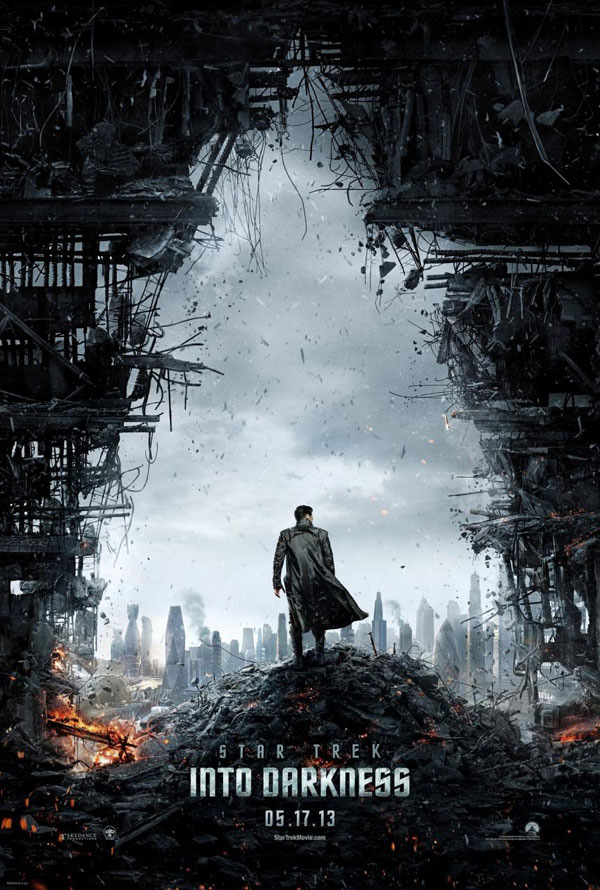Title: Star Trek Into Darkness
Directed By: J.J. Abrams
Starring: Chris Pine, Zachary Quinto, Zoe Saldana, Karl Urban, John Cho, Bruce Greenwood, Simon Pegg, Anton Yelchin, Benedict Cumberbatch, Alice Eve, Peter Weller
“Star Trek Into Darkness” isn’t as effective as the first film overall, but there are so many exceptional set pieces within the whole that it packs more than enough momentum to pull through and deliver a riveting experience.
The film begins mid-mission with the crew of the Enterprise trying to keep a volcano from exploding, destroying an alien planet, and killing its inhabitants. When things go awry, Kirk (Chris Pine) makes some brash decisions and even though he gets his ship and crew out in one piece, Starfleet isn’t pleased that he disobeyed orders and Kirk is demoted. However, when a bomb is detonated in London and the Starfleet headquarters are attacked, Admiral Marcus (Peter Weller) opts to reinstate Kirk so he can eradicate the enemy – John Harrison (Benedict Cumberbatch).
The film kicks off exceptionally well. The chase scene on Planet Nibiru is downright mesmerizing courtesy of the planet’s lush red plant life and eerily fascinating looking natives, and also because it involves an engaging and clear-cut mission. While there are loads more easy-to-follow, gorgeously shot mini tasks to come, there’s just so long the cycle can continue before you’ve had enough.
Initially, it seems as though the main mission is to bring John Harrison down, however due to ethics, Starfleet rules, and potential loss of life, that ultimate goal is incessantly being altered and essentially breaks down into a series of mini missions. First Kirk is tasked with flat-out killing Harrison, but the moral obligation to give the perpetrator a trial spoils that. Kirk readjusts and opts to take him into custody, but then new information foils that trajectory, too. Clearly it can’t be smooth sailing for a starship crew attempting to save the world from a madman, but the pattern is so overwhelmingly obvious, it makes the material predictable.
With predictability comes the problem of a lack of suspense. First off, knowing what’s coming inherently kills anticipation, but further taking away from the momentum of the film is the fact that there’s such a clear break in between in each action sequence. Rather than piece them together in a way to build the narrative and the experience, the viewer is hurled from one segment of the film to the other. There are some spectacular battles towards the tail end of the film, but they don’t feel like a climax because at that point, not only have you identified the pattern, but you’re also exhausted by it.
While the film may not work as a whole, there still are a number of noteworthy scenes within it – both in terms of action and pure drama. The Planet Nibiru chase sequence is the biggest winner of the bunch, but another during which Kirk zips from one ship to another through space using an in-helmet navigation system is also highly enjoyable as the action is downright exhilarating and it’s particularly well intercut with a moment featuring a frantic Scotty (Simon Pegg), a technique that both ups the humor and peril of the moment.
As for the drama, “Star Trek Into Darkness” features solid performances almost all around. As expected, Pine and Zachary Quinto as Spock are the big winners. Their arcs are too blunt at times and wishy-washy at others, but both actors have the parts down so well that they manage to sell just about everything from the amusing banter to some particularly intense emotional scenes. Zoe Saldana has a few memorable moments as Uhura, but is largely underused and newcomer Alice Eve scored a juicy little subplot, but sadly it’s underwritten leaving her as Kirk’s new eye candy and not much more. Karl Urban, Simon Pegg, John Cho, and Antony Yelchin get more face time here and all put it to good use. Urban, Pegg, and Yelchin mainly stand out courtesy of good laughs and exciting last minute saves, while Cho gets to add an intriguing new side to Sulu, one he’ll hopefully explore further should the franchise go for round three.
The only character that can’t escape the film’s fizzling suspense is John Harrison and it’s painfully unfortunate because Cumberbatch makes for a brilliant villain. It’s good fun watching Harrison engage in some hand-to-hand combat and blow his targets away, but it’s his unwavering confidence and eloquence that make him such an unnerving force. If only the film supported his performance with a more powerful build, John Harrison could have become a truly remarkable character.
The “Star Trek Into Darkness” narrative is undeniably flawed, but thoughtful filmmaking is still very evident in a number of respects, so the lack of connectivity between those thoughts isn’t detrimental.
Technical: A-
Acting: A-
Story: B-
Overall: B

